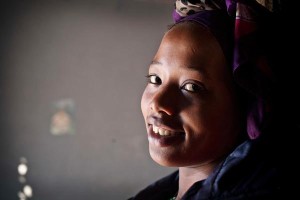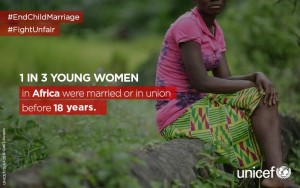An Investment in Girls is an Investment for All
Jul 10th, 2016 | By admin | Category: Youth RightsBy Suzanne York.

[Jamila Zeyne, who is 20 years old, and who has been married since she was 13, poses for a photograph as part of a UNICEF photo project to show Girls Empowerment in Ethiopia.]
This year’s theme for World Population Day is “investing in teenage girls.” In much of the world today their needs are shunted to the back burner or ignored altogether, with girls lacking education, healthcare, and other basic rights.
It is a great opportunity to highlight how empowering young women can go a long way toward improving not just a girl’s life, but also the state of her family, community, and greater society, including the environment.
Giving young women a voice and a helping hand is key. So is ending practices that take everything away from them before they even begin living their lives, such as child marriage – 15 million girls marry before the age of 18 each year, or one every 2 seconds.
Ending Child Marriage: Ethiopia’s Experience
One country that is working hard to improve the lives of young women is Ethiopia. Amongst the problems facing many Ethiopian girls is child marriage.
In Ethiopia, two in every five girls are married before their 18th birthday and nearly one in five girls marries before the age of 15. Fortunately, this is changing; according to UNICEF, the practice of child marriage in Ethiopia has shown significant decline in recent years, and the government has committed to ending child marriage by 2025 (and in 2013 implemented the National Strategy and Action Plan on Harmful Traditional Practices Against Women and Children).
Child marriage is fueled by poverty, gender inequality, culture and insecurity.
Girls who are forced to marry young tend to have a lot of pregnancies. While Ethiopia has made strides in lowering its total fertility rate – currently at 4.1 – its population is still projected to increase from 99 million today to over 127 million by 2037. Research shows that child marriage is associated with a lower likelihood of using contraceptives.
One way to improve awareness and access to voluntary family planning services is by employing health extension workers (HEW). Ethiopia has been very successful with its flagship Health Extension Program, where health extension workers go to rural villages and are trained to provide family planning counseling and contraceptive products to married women regardless of age. More than 38,000 health extension workers are employed across the nation to bring Ethiopians primary health care services, particularly in rural areas where 84 percent of the population lives.
In addition to providing health services, the health extension worker program offers a way to provide sustainable livelihoods by employing young women. It is also an opportunity for peer-to-peer education, another positive way to affect change.
Changing Culture From Within
UNICEF shares the story of how becoming a HEW changed one young woman’s life, and the way her work is changing views towards child marriage in the Amhara region of Ethiopia.
Hebeste Admas became a health extension worker at the age of 17, and part of her job involves educating community members on the health impacts of child marriage.
Admas told UNICEF, “In my 9 years as a Health Extension Worker I have seen a decline in child marriage as a result of community awareness, and I do believe the practice will stop. I report cases to the police. There is no confidentiality as they are breaking the law.”
Encouragingly, elders in rural Ethiopian communities have also been involved in changing the cultural narrative on child marriage. Respected elders are part of Community Conversation Group against Child Marriage that support girls’ education over early marriage (read more at UNICEF).
Support Girls in Ethiopia and Beyond
Earlier this year the UN Population Fund and UNICEF launched the Global Program to Accelerate Action to End Child Marriage, a multi-country initiative to accelerate action to end the practice.
The program “will focus on proven strategies, including increasing girls’ access to education and health care services, educating parents and communities on the dangers of child marriage, increasing economic support to families, and strengthening and enforcing laws that establish 18 as the minimum age of marriage.”
If you want to help make a difference, visit Girls Not Brides on ways to take action. It starts with raising all of our voices in support of girls’ rights.
There will not be any stabilizing of world population levels without empowering and investing in girls. It goes beyond young women – respecting human rights for all – but the need is greatest for the girl child whose well-being has been ignored far too long.
Suzanne York is Project Director of Transition Earth.


![[photo credit: UNICEF]](http://populationgrowth.org/wp-content/uploads/2016/07/AU-campaign-UNICEF-endchildmarriageNOW-600x418-300x209.jpg)